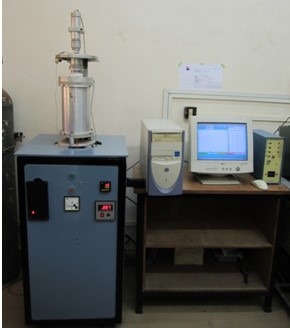

Dilatometry is a thermo analytical technique, which measures linear dilation (expansion/shrinkage) of solid materials as a function of temperature. It is an important technique for physico-chemical characterization of materials and finds wide application in research/development/application of variety of materials (ceramics, polymers, metals, alloys, glasses, composites, etc.) in research, material development, quality control, engineering applications, etc.
Dilatometry is a thermo analytical technique, which measures linear dilation (expansion/shrinkage) of solid materials as a function of temperature. It is an important technique for physico-chemical characterization of materials and finds wide application in research/development/application of variety of materials (ceramics, polymers, metals, alloys, glasses, composites, etc.) in research, material development, quality control, engineering applications, etc.
The developed technology is a simple, easy to operate, automated, cost effective equipment that gives reliable, accurate and reproducible information about linear thermal dilation of variety of solid materials. The equipment is capable to characterize thermal dilation behavior of a variety of materials in temperature range from 298 K to 1373 K under air/inert atmosphere. The equipment is a handy tool to characterize linear thermal expansion behavior, sintering behavior, glass transition and other phase transitions occurring in a material.
Ceramic technology, metals & alloys, nuclear technology, glasses and glass-ceramics, polymer and rubber technology, composite materials development, sintering studies on powdered materials (powder metallurgy), research on high temperature solids, etc.
Dilatometry is a thermo analytical technique, which measures linear dilation (expansion/shrinkage) of solid materials as a function of temperature. By measuring the linear dilation of a material as a function of temperature (or time), its physico-chemical characterization can be carried out, which include evaluation of coefficient of thermal expansion, sintering behavior, glass transition and other structural phase transitions, etc. The technique is also used to study solid-gas surface chemical reactions under controlled conditions. The technique finds wide application in study and development of a variety of materials (ceramics, polymers, metals, alloys, glasses, composites, etc.) in research, development, quality control and engineering applications.
The developed technology is an indigenously designed, easy to operate, cost effective, automated equipment based on linear variable differential transformer (LVDT). It is useful for measurement of temperature dependent dilation (thermal expansion/shrinkage) of solids in temperature range from 298 to 1373 K. The equipment is a versatile tool to characterize linear thermal expansion behavior, sintering behavior, glass transition and other phase transitions occurring in a material.
| Temperature range | RT – 1373 K |
|---|---|
| Temperature Resolution | 1 K |
| Temperature accuracy | ± 0.2 K |
| Furnace | Kanthal resistive furnace |
| Sensor | Linear variable differential Transformer(LVDT) |
| Dilation range | ± 1000 µm |
| Resolution (dilation) | ± 0.1 µm |
| Sample Holder | Alumina/Quartz |
| Data acquisition system | microcontroller-based hardware & window-based software |
| Power requirements | 230 V (± 5%), 50 Hz, single phase AC |
| Dimensions | ~ 2 feet x 2 feet x 6 feet (length x width x height) |
The developed technology finds widespread applications in ceramic technology, nuclear technology, metals & alloys development, glasses and glass-ceramics, polymer and rubber technology, composite materials development, sintering studies on powdered materials (powder metallurgy) and research on high temperature solids.
RAW MATERIALS
INFRASTRUCTURE
SPACE
MANPOWER
